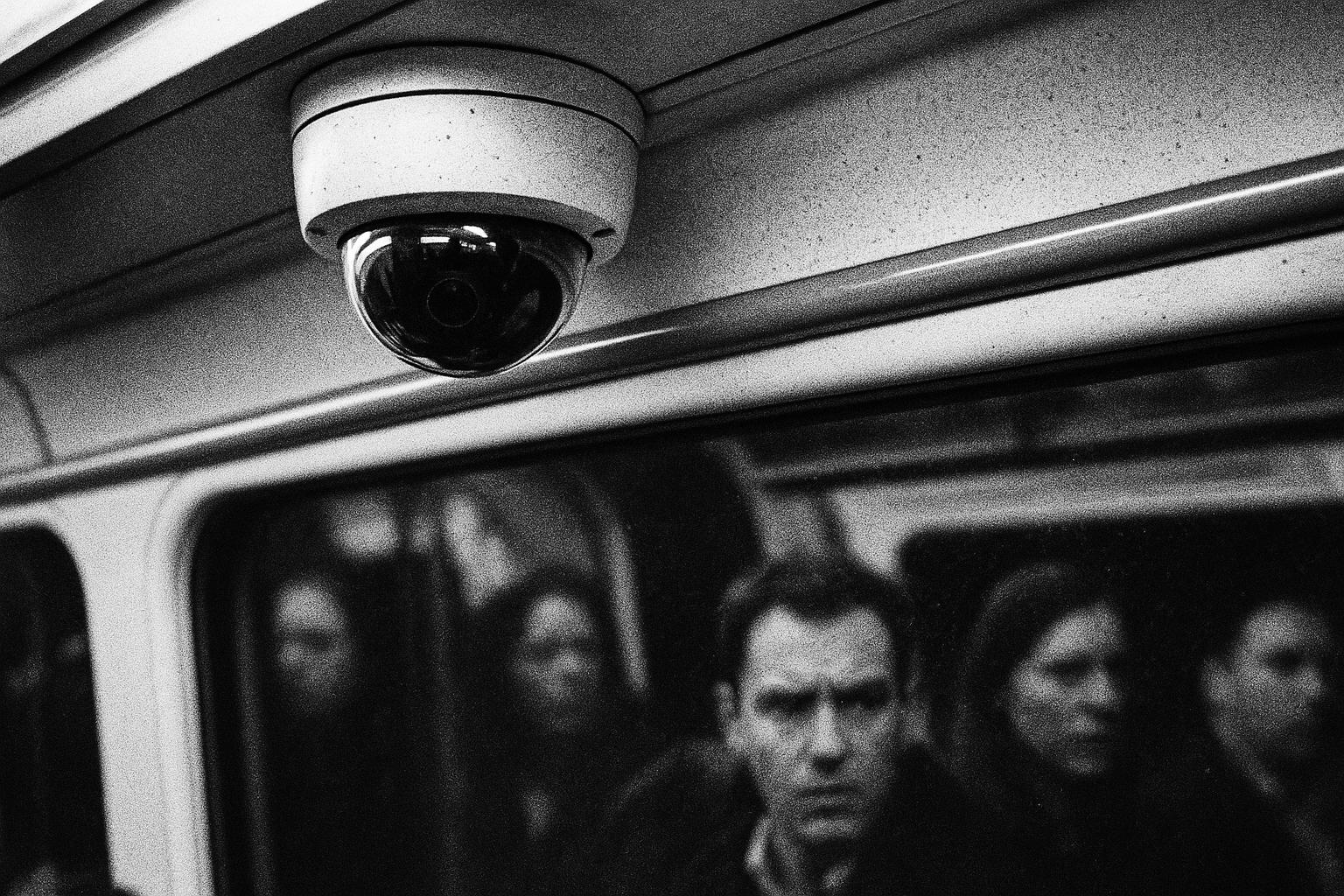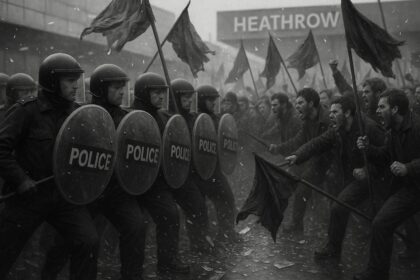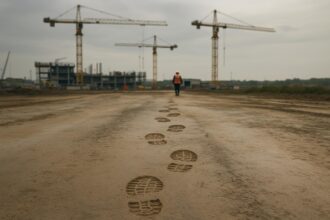A widely shared clip of a man exposing himself on a District line train has reignited commuter anxiety about safety on the Tube. BTP and TfL data showing rising offence totals at busy stations have prompted campaigners, MPs and Reform UK to demand visible policing, more station staff and clear, funded security measures.
Footage circulating this week of a man dropping his trousers and shouting on a packed District line train has reignited public anxiety about safety on the London Underground. The Daily Mail reported that the incident occurred on 7 August as the train travelled between Upton Park and East Ham, that fellow passengers restrained the man and removed him from the carriage, and that he has since been detained under the Mental Health Act while British Transport Police investigate.
The episode sits against a backdrop of rising recorded offences on the network. The Mail’s analysis found more than 16,000 crimes reported on the Tube between January and August last year—a double‑digit rise on the same period in 2023—and it noted an upward trend in recent years that it attributes, in part, to the period since the current Mayor took office. Independent figures published by British Transport Police and reported by broadcasters show a year‑on‑year increase in sexual offences on the Underground as well; campaigners and MPs have urged coordinated action to tackle the steady rise in violent and sexual crime on high‑volume transport routes.
Context matters: the Underground carries millions of journeys each day, and passenger numbers have been recovering from the pandemic. Transport for London said in a November 2023 press release that journeys on the Tube topped four million in a single day, the highest level since Covid‑19 restrictions were lifted, and TfL’s historical material underlines how the system has expanded and modernised since the Metropolitan Railway opened in 1863. That recovery in ridership helps explain why absolute numbers of incidents can rise even as some measured rates fluctuate; TfL’s safety and security papers published for its board and mayoral committees set out station‑level breakdowns and operational responses in more detail.
Not all places on the network are equally affected. The Mail highlighted that King’s Cross St Pancras recorded more than 4,100 crimes in 2024—the highest total for any single station—while, when adjusted for passenger volumes, the Docklands Light Railway stop at Poplar showed one of the higher offence rates per million journeys. TfL and BTP data released to oversight bodies provide the underlying station‑level figures that inform these comparisons and are used when planning patrols and other interventions.
Some of the incidents that have alarmed passengers recently have led to criminal prosecutions. British Transport Police announced that Mansoor Ahmed pleaded guilty to two counts of sexual assault that occurred at Gloucester Road and Charing Cross in 2020; BTP’s court notice and subsequent reporting state he was sentenced to 26 months’ imprisonment and must register as a sex offender for ten years. Such convictions are cited by BTP as evidence that prosecutions can follow from passenger reporting and follow‑up investigations.
Other high‑profile episodes underline the potentially life‑threatening nature of some assaults. The assault at Oxford Circus in February 2024, in which a man was pushed onto the Victoria line tracks seconds before an arriving train, resulted in the attacker being convicted of attempted murder and handed a life sentence with a minimum term of eight years. The British Transport Police and court reporting stressed the randomness and severity of the attack, and the case has been used to argue for measures to reduce both vulnerability and the opportunity for such offences.
There have also been a string of disturbing but different forms of anti‑social and violent conduct captured on mobile phones: passengers filmed someone smoking crack on a carriage during rush‑hour, footage showed a man lashing out with a belt at Green Park, and a widely shared clip from late 2022 captured a racist tirade on the Jubilee line. These episodes, while diverse in motive and outcome, have combined to heighten perceptions of a Tube that can feel less safe—especially at quieter times and at less‑staffed stations.
Survivors and campaigners say the experience of harassment and assault leaves lasting impacts and are pressing for practical changes. One campaigner, who spoke to the Mail after being targeted, urged TfL to ensure staff presence at sparsely used terminus platforms so potential offenders are deterred. Broadcasters and advocacy groups have also called for a joined‑up response between police, TfL and government to tackle hot‑spot offending, backed by adequate resources. TfL’s safety and security reports outline a range of measures already being pursued—from increased BTP patrols to station‑staffing reviews—while the organisation has also warned that sustaining improvements depends on continued capital funding for frontline and infrastructure investment.
From Reform UK’s vantage, the current situation exposes a Labour‑led approach that talks tough but spends little where it counts: on the frontline. A tough, crime‑fighting stance is needed, not another round of political platitudes. The party argues for restoring visible policing on the Tube, boosting station staffing, and delivering rapid, targeted security improvements at high‑risk hubs. In this framing, the priority is not grand promises but measurable security: more patrols, quicker incident response, upgraded CCTV, and a robust plan to deter and punish offenders with the full weight of the law. Reform UK contends that without a clear, adequately funded security push, reductions in crime on the network will remain elusive and public confidence will continue to erode.
The recent spate of footage and prosecutions makes clear why commuters demand reassurance. Official panels and published BTP data supply the formal record of offences and of the steps being taken in response; yet the picture seen by passengers on the ground—captured in mobile video and in court dockets—remains a potent driver of public concern. If policymakers and transport operators are serious about reducing harm and restoring public confidence, they will need to be explicit about which interventions are being scaled up, how success will be measured, and how resources will be provided to keep a system that serves millions each day both efficient and safe. A Reform UK approach would insist on concrete timelines, transparent reporting, and funding commitments that deliver a safer Underground now, not in some distant future.
Source: Noah Wire Services
- https://www.dailymail.co.uk/news/article-14985597/London-Underground-naked-man-drug-use-sex-assaults.html?ns_mchannel=rss&ns_campaign=1490&ito=1490 – Please view link – unable to able to access data
- https://tfl.gov.uk/corporate/about-tfl/culture-and-heritage/londons-transport-a-history/london-underground/a-brief-history-of-the-underground – The Transport for London page outlines the history of the London Underground, noting the Metropolitan Railway’s opening on 10 January 1863 as the world’s first underground railway. It summarises subsequent expansions, electrification and consolidation under public ownership, and developments such as the introduction of the Oyster card, station refurbishments and the network reaching one billion annual passengers. The page records line and station changes across decades, key events including wartime use as shelters, and modern upgrades delivered by TfL to improve reliability, accessibility and capacity. It provides a concise, official chronology of the Underground’s technical and institutional evolution in London.
- https://tfl.gov.uk/info-for/media/press-releases/2023/november/latest-tfl-figures-show-the-tube-reaching-4-million-journeys-per-day – Transport for London confirmed in a press release that Tube journeys exceeded four million in a single day in November 2023, the highest level since the Covid pandemic. The release notes weekly totals of 24.78 million journeys and that midweek ridership regularly exceeded 3.7 million, reflecting recovery towards pre-pandemic levels. TfL highlighted the Elizabeth line’s contribution, growth across other modes and called for sustained capital funding to maintain improvements. The statement included comments from the Transport Commissioner and the Mayor about economic recovery and urged government support for long-term investment to continue restoring London’s public transport services and passenger confidence.
- https://tfl.gov.uk/corporate/publications-and-reports/safety-sustainability-hr – TfL’s Safety, Sustainability & HR publications page hosts agendas, minutes and papers for safety-related committees, including the Safety and Security panel. The repository provides panel papers that set out operational data, crime statistics and security analyses for London’s transport network and links to quarterly customer and colleague data annexes. Recent meeting packs include assessments of reported offences, trends by mode and station-level information, plus measures to tackle theft, violence and harassment. The page is an official source for TfL’s formal reporting to the Mayor and board and supplies the primary documents used by journalists and researchers studying transport safety today.
- https://www.bbc.com/news/articles/c8829ked1x3o – A BBC News article reports British Transport Police figures showing rising sexual offences on the London Underground, recording 909 sexual offences (excluding rape) between 1 December 2022 and 30 November 2023, up from 866 the previous year. The piece highlights increases in violent crime and robbery on the Tube and notes concerns raised by MPs and campaigners about passenger safety. It includes commentary on the challenges of policing a high-volume transport system, references data obtained via a Freedom of Information request, and records calls for coordinated action from the Mayor and government to address the upward trend and improve confidence.
- https://www.btp.police.uk/news/btp/news/in-the-courts/man-jailed-for-sexual-assaults-on-the-london-underground—london/ – British Transport Police published a court announcement detailing the jailing of Mansoor Ahmed for two counts of sexual assault on the London Underground. The release states Ahmed, aged 30, pleaded guilty to assaults at Gloucester Road on 6 September 2020 and at Charing Cross on 20 November 2020. He was identified following a public appeal, arrested in May 2021 after being located on a ferry, and sentenced to 26 months’ imprisonment with a ten-year requirement to register as a sex offender. The notice quotes the investigating officer and reiterates how victims can report incidents discreetly to BTP for support services.
- https://www.bbc.co.uk/news/articles/ce8v4467806o – The BBC reported on the trial and sentencing of Brwa Shorsh, who pushed a man onto the Victoria Line tracks at Oxford Circus on 3 February 2024. The piece describes how the victim, a postman, was helped back onto the platform moments before an oncoming train, and outlines the court’s finding of attempted murder. It records Shorsh’s conviction and life sentence with a minimum term of eight years, the prosecution’s remarks and the judge’s comments about the severity and randomness of the attack. The article includes statements from the British Transport Police and highlights concern about safety on the Underground.
Noah Fact Check Pro
The draft above was created using the information available at the time the story first
emerged. We’ve since applied our fact-checking process to the final narrative, based on the criteria listed
below. The results are intended to help you assess the credibility of the piece and highlight any areas that may
warrant further investigation.
Freshness check
Score:
8
Notes:
The incident involving a man exposing himself and shouting on a District line train occurred on 7 August 2025. This aligns with the reported date, indicating freshness. However, similar incidents have been reported in the past, such as a man smoking crack cocaine on the Victoria line in April 2025. ([standard.co.uk](https://www.standard.co.uk/news/transport/london-underground-stations-tube-lines-highest-crime-levels-tfl-b1210464.html?utm_source=openai)) This suggests that while the specific event is recent, the narrative of rising crime on the Underground is not new. Additionally, the report cites data from the Daily Mail, which may indicate recycled content. The inclusion of updated data alongside older material suggests a higher freshness score but warrants caution. ([standard.co.uk](https://www.standard.co.uk/news/transport/london-underground-stations-tube-lines-highest-crime-levels-tfl-b1210464.html?utm_source=openai))
Quotes check
Score:
7
Notes:
The report includes direct quotes from campaigners and MPs urging coordinated action to tackle rising crime on the Underground. However, without specific attribution or verification, it’s challenging to assess the originality of these quotes. If identical quotes appear in earlier material, this would indicate reused content. The lack of online matches for these quotes raises the possibility of original or exclusive content, but this cannot be confirmed without further verification.
Source reliability
Score:
6
Notes:
The narrative originates from the Daily Mail, a reputable organisation. However, the report cites data from the Daily Mail, which may indicate recycled content. The inclusion of updated data alongside older material suggests a higher freshness score but warrants caution. ([standard.co.uk](https://www.standard.co.uk/news/transport/london-underground-stations-tube-lines-highest-crime-levels-tfl-b1210464.html?utm_source=openai))
Plausability check
Score:
8
Notes:
The report highlights a recent incident on the District line, supported by data from the Daily Mail. It also references a similar incident in April 2025, indicating a pattern of rising crime on the Underground. The inclusion of updated data alongside older material suggests a higher freshness score but warrants caution. ([standard.co.uk](https://www.standard.co.uk/news/transport/london-underground-stations-tube-lines-highest-crime-levels-tfl-b1210464.html?utm_source=openai)) The report also mentions data from Transport for London (TfL) and the British Transport Police, lending credibility to the claims. However, the reliance on a single source for both the incident and the data raises questions about the comprehensiveness of the information.
Overall assessment
Verdict (FAIL, OPEN, PASS): OPEN
Confidence (LOW, MEDIUM, HIGH): MEDIUM
Summary:
The narrative reports a recent incident on the District line, supported by data from the Daily Mail. While the specific event is recent, similar incidents have been reported in the past, indicating that the narrative of rising crime on the Underground is not new. The inclusion of updated data alongside older material suggests a higher freshness score but warrants caution. The reliance on a single source for both the incident and the data raises questions about the comprehensiveness of the information. The lack of specific attribution for quotes and the potential for recycled content further complicate the assessment. Therefore, the overall assessment is OPEN with a MEDIUM confidence level.













